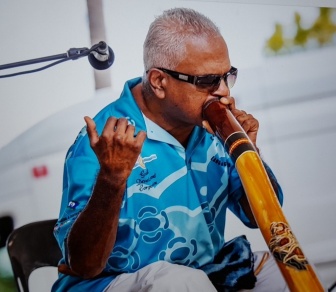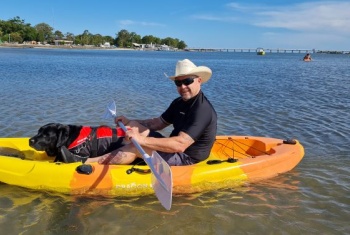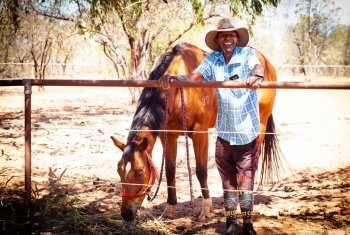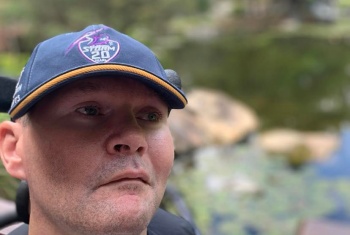For NDIS participant, Michael Ambyrum, a deep love of country and sharing his culture forms a determination at the heart of everything he does.
The proud Yidinji, who hails from Far North Queensland but currently lives in Rockhampton, uses his NDIS supports to stay connected to community and inspire others to embrace Aboriginal cultures.
Michael, 49, who has had both legs amputated from the knees down due to diabetes, has rubbed shoulders with celebrities and performed on stage with Indigenous dance troupes.
Trekking the globe since he was 16, Michael has also toured the US with Tourism Queensland, performed in front of 160,000 people at WOMADelaide, and presented a didgeridoo to former boxing world champion, Rubin “Hurricane” Carter.
“Culture is very important to me, culture is very important for everyone, not just Indigenous, but for non-Indigenous people who need to learn more about our culture, more about understanding Aboriginal history,” Michael said.
“I like to put back into the community, it’s very important to me.”
That commitment to culture continues to drive him forward after his life changed forever following his diabetes diagnosis.
After his first amputation 3 years ago, Michael said he was eager to get up and about, surprising his physiotherapist with how quickly he started to walk unaided.
Following his second amputation around 18 months ago, trained himself to walk on 2 prosthetics. He attributes his success to a positive mental outlook.
“Your mind is a powerful thing, and we must use it to its full ability. I know I just don’t want to be stuck at home 24/7.
“My will power was always there, and I never lost sight of what I wanted to do… I just wanted to get my independence back”.
With help from his Local Area Coordination partner, Carers Queensland, Michael uses his NDIS funding to access assistive technology such as his prosthetic legs and wheelchairs.
Receiving cleaning and yard supports, Michael has also used his funding for home modifications with an entry ramp into his bathroom.
“I’m very happy with the NDIS… it helps me mentally and physically, and definitely takes a big load off my shoulders,” he said.
“I don’t have to worry about cleaning up the house or getting out into the yard. The NDIS comes into play and it’s a big reliever.”
These days Michael is content in being a part of the crowd while helping “young fellas” to make a name for themselves and learn about their culture.
Attending local men’s shed groups and other community events, Michael remains active.
When he’s not out and about, Michael’s making artefacts such as spears and pool cues. He recently spent two-and-a-half days hand painting a crocodile on one of his many digeridoos.
With an in-depth knowledge of bushtucker and medicine, Michael says he’s committed to teaching others the ways of his ancestors, which can be celebrated through the likes of NAIDOC Week.
“I’ve still got that in my brain, and I am passing it on to younger generations,” Michael said.
“The young are starting to learn more about their culture and identity, and with things like NAIDOC Week showcasing culture, these kids can show that.
“I’m determined to keep finding ways to keep myself active in the community, help others on similar journeys and show young fellas that there’s a lot of life worth living out there.”
Looking back on all his accomplishments achieved across the globe, a commitment to his identity as a Yidinji elder and assisting with upcoming land council meetings in his home region of Kuranda, ensure Michael’s goals now play out domestically.
Spending time with his kids and five grandchildren form a long-term goal, which Michael said would aim to carry on his, and his people’s legacy for years to come.
“Long-term, I want a healthier lifestyle so I can live a longer life to see my grandkids grow up and learn our language and culture,” Michael said.
“I achieved everything I wanted in my life, and I know my kids and grandkids can go further, so, they’ll have that knowledge.”



